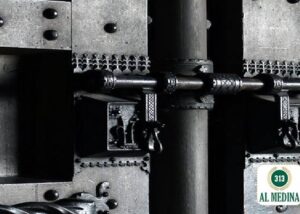Quran
Hadith
Islamic Text
بِسْمِ اللَّهِ الرَّحْمَنِ الرَّحِيمِ
In the Name of Allah Most Merciful Most Kind
Short Answer
No, a Muslim who kills himself (suicide) does not go to Hell forever. Since this person is still a believer, he or she will end up in Jannah (Paradise). This is because all believers eventually go to paradise.
Warning in hadith
عَنْ أَبِي هُرَيْرَةَ رَضِيَ اللَّهُ عَنْهُ، عَنِ النَّبِيِّ صَلَّى اللهُ عَلَيْهِ وَسَلَّمَ قَالَ: مَنْ تَرَدَّى مِنْ جَبَلٍ فَقَتَلَ نَفْسَهُ، فَهُوَ فِي نَارِ جَهَنَّمَ يَتَرَدَّى فِيهِ خَالِدًا مُخَلَّدًا فِيهَا أَبَدًا، وَمَنْ تَحَسَّى سُمًّا فَقَتَلَ نَفْسَهُ، فَسُمُّهُ فِي يَدِهِ يَتَحَسَّاهُ فِي نَارِ جَهَنَّمَ خَالِدًا مُخَلَّدًا فِيهَا أَبَدًا، وَمَنْ قَتَلَ نَفْسَهُ بِحَدِيدَةٍ، فَحَدِيدَتُهُ فِي يَدِهِ يَجَأُ بِهَا فِي بَطْنِهِ فِي نَارِ جَهَنَّمَ خَالِدًا مُخَلَّدًا فِيهَا أَبَدًا
Abu Hurairah (May Allah Most High be pleased with him) narrated that the Messenger of Allah ﷺ said, ‘Whoever throws himself from a mountain and thus kills himself, will be in the fire of Hell throwing himself eternally therein forever abiding. And whoever ingests poison and thus kills himself, will be in the fire of Hell eternally ingesting the poison by his hand therein forever abiding. And whoever kills himself with an iron implement, will be in the fire of Hell eternally stabbing himself in his stomach with his own hand therein forever abiding.’ (Sahih al-Bukhari, 5778).
The above Hadith provides a catastrophic warning against suicide. However, it must be considered in light of other relevant proofs from Quran and Sunnah. Therefore, anyone wishing to speak on the issue of a Muslim who kills himself (suicide) going to Hell forever or not, must consider the following verse too.
Suicide is not kufr
إِنَّ اللَّهَ لا يَغْفِرُ أَنْ يُشْرَكَ بِهِ وَيَغْفِرُ مَا دُونَ ذلِكَ لِمَنْ يَشاءُ وَمَنْ يُشْرِكْ بِاللَّهِ فَقَدِ افْتَرى إِثْماً عَظِيماً
Indeed, Allah does not forgive associating others with Him but forgives anything other than it for whomsoever He wills. And whoever associates others with Allah has indeed committed a grave sin. (Surah al-Nisa, 48).
The noble verse above makes it clear that anything other than Shirk (polytheism) is liable to being forgiven. As suicide is not Shirk, forgiveness remains possible. In the authentic Hadith below, we find the Blessed Prophet ﷺ making Dua for a person who killed himself. We know that it is not permitted to make Dua for a Kafir (disbeliever). Consequently, suicide does not render one a Kafir.
عَنْ جَابِرٍ أَنَّ الطُّفَيْلَ بْنَ عَمْرٍو الدَّوْسِيَّ، أَتَى النَّبِيَّ صَلَّى اللهُ عَلَيْهِ وَسَلَّمَ، فَقَالَ: يَا رَسُولَ اللهِ، هَلْ لَكَ فِي حِصْنٍ حَصِينٍ وَمَنْعَةٍ؟ – قَالَ: حِصْنٌ كَانَ لِدَوْسٍ فِي الْجَاهِلِيَّةِ – فَأَبَى ذَلِكَ النَّبِيُّ صَلَّى اللهُ عَلَيْهِ وَسَلَّمَ لِلَّذِي ذَخَرَ اللهُ لِلْأَنْصَارِ، فَلَمَّا هَاجَرَ النَّبِيُّ صَلَّى اللهُ عَلَيْهِ وَسَلَّمَ إِلَى الْمَدِينَةِ، هَاجَرَ إِلَيْهِ الطُّفَيْلُ بْنُ عَمْرٍو وَهَاجَرَ مَعَهُ رَجُلٌ مِنْ قَوْمِهِ، فَاجْتَوَوُا الْمَدِينَةَ، فَمَرِضَ، فَجَزِعَ، فَأَخَذَ مَشَاقِصَ لَهُ، فَقَطَعَ بِهَا بَرَاجِمَهُ، فَشَخَبَتْ يَدَاهُ حَتَّى مَاتَ، فَرَآهُ الطُّفَيْلُ بْنُ عَمْرٍو فِي مَنَامِهِ، فَرَآهُ وَهَيْئَتُهُ حَسَنَةٌ، وَرَآهُ مُغَطِّيًا يَدَيْهِ، فَقَالَ لَهُ: مَا صَنَعَ بِكَ رَبُّكَ؟ فَقَالَ: غَفَرَ لِي بِهِجْرَتِي إِلَى نَبِيِّهِ صَلَّى اللهُ عَلَيْهِ وَسَلَّمَ، فَقَالَ: مَا لِي أَرَاكَ مُغَطِّيًا يَدَيْكَ؟ قَالَ: قِيلَ لِي: لَنْ نُصْلِحَ مِنْكَ مَا أَفْسَدْتَ، فَقَصَّهَا الطُّفَيْلُ عَلَى رَسُولِ اللهِ صَلَّى اللهُ عَلَيْهِ وَسَلَّمَ، فَقَالَ رَسُولُ اللهِ صَلَّى اللهُ عَلَيْهِ وَسَلَّمَ: اللهُمَّ وَلِيَدَيْهِ فَاغْفِرْ
(Sayidina) Jabir narrated that Tufail bin Amr al-Dawsi (May Allah Most High be pleased with them both) came to the Prophet ﷺ and said: Would you like a fortified fortress and robust protection? The tribe of Daws had a fort in the pre-Islamic days. The Prophet ﷺ declined the offer due to what Allah (Most High) had reserved for the Ansar. When the Prophet ﷺ migrated to Madinah, Tufail bin Amr and a man from his tribe also migrated to it (May Allah Most High be pleased with them both). But the climate of Madinah did not suit him (the man), and he fell sick. Subsequently he despaired. So he took hold of an arrowhead and cut his finger-joints. The blood streamed forth from his hands, and he died.
Subsequently, Tufail bin Amr saw him (the man) in a dream. He was in a good state. However, he saw that he had wrapped his hands. He (Tufail) said to him: What treatment did your Lord (Most High) accord to you? He replied. Allah (Most High) granted me pardon due to my migration to the Prophet ﷺ. He (Tufail) said: Why is it that I see that you have wrapped your hands? He replied: It was said to me: We will not set right that which you damaged yourself. (Sayidina) Tufail narrated it to the Messenger of Allah ﷺ. The Messenger of Allah ﷺ supplicated, ‘O Allah forgive his hands.’ (Muslim 116 – 184).
Classical scholars
After considering the relevant evidence, scholars of Ahl al-Sunnah concluded that a Muslim who kills himself (commits suicide) will not remain in Hell forever. Rather, the wording in the Hadith is for emphasis.
أَمَّا أَحْكَامُ الْحَدِيثِ فَفِيهِ حُجَّةٌ لِقَاعِدَةٍ عظيمة لِأَهْلِ السُّنَّةِ أَنَّ مَنْ قَتَلَ نَفْسَهُ أَوِ ارْتَكَبَ مَعْصِيَةً غَيْرَهَا وَمَاتَ مِنْ غَيْرِ تَوْبَةٍ فَلَيْسَ بِكَافِرٍ وَلَا يُقْطَعُ لَهُ بِالنَّارِ بَلْ هُوَ فِي حُكْمِ الْمَشِيئَةِ وَقَدْ تَقَدَّمَ بَيَانُ الْقَاعِدَةِ وَتَقْرِيرُهَا وَهَذَا الْحَدِيثُ شَرْحٌ لِلْأَحَادِيثِ الَّتِي قَبْلَهُ الْمُوهِمُ ظَاهِرُهَا تَخْلِيدَ قَاتِلِ النَّفْسِ وَغَيْرِهِ مِنْ أَصْحَابِ الْكَبَائِرِ فِي النَّار. (المنهاج شرح صحيح مسلم بن الحجاج)
As for rulings derived from the Hadith, in it is proof for the profound maxim of the Ahl al-Sunnah. Namely, the one who killed himself or committed another sin and then died without repentance, is not a disbeliever and he will not definitively go to the fire. Rather, he is in the realm of divine determination (Mashi’ah). The explication and confirmation of which has already been presented.
This Hadith serves as an exposition of the previous Hadith narrations that ostensibly suggest that the one who kills himself, and others among the major sinners, remain in hellfire eternally. (Imam al-Nawawi, Sharh Sahih Muslim).
Furthermore, in the Nass (text) below, Imam al-Sarakhsi provides another explanation for the Hadith above. He suggests that the assertion in the Hadith regarding the one who kills himself remaining in hell forever is applicable to someone who considered it permissible. This aligns with the position of Ahl al-Sunnah that rejecting something that is irrefutably established in the religion is Kufr (disbelief).
وَكَانَ شَيْخُنَا الْإِمَامُ يَقُولُ: الْأَصَحُّ عِنْدِي أَنْ يُصَلَّى عَلَيْهِ وَأَنْ تُقْبَلَ تَوْبَتُهُ إنْ كَانَ تَابَ فِي ذَلِكَ الْوَقْتِ لِقَوْلِهِ تَعَالَى {وَيَغْفِرُ مَا دُونَ ذَلِكَ لِمَنْ يَشَاءُ} [النساء: 48]. وَتَأْوِيلُ الْحَدِيثِ فِيمَنْ اسْتَحَلَّ ذَلِكَ، لِمَا رُوِيَ أَنَّ النَّبِيَّ – صَلَّى اللَّهُ عَلَيْهِ وَسَلَّمَ – قَالَ: سِبَابُ الْمُسْلِمِ فِسْقٌ وَقِتَالُهُ كُفْرٌ. (شرح السير الكبير)
The Imam, our Shaykh, says: ‘The stronger opinion is that he is to be prayed upon and that his repentance is accepted, if he repents in that moment, based on His (Most HighHigh) saying: ‘And he forgives anything less than that for whoever He wills.’ (Surah al-Nisa, 48). The interpretation of the Hadith is that it is referring to those who considered it (suicide) permissible. This is due to what has been narrated from the Prophet ﷺ: ‘Insulting a Muslim is depravity and fighting him is disbelief (Kufr).’ (Imam al-Sarakhsi, Sharh al-Siyar al-Kabeer).
Conclusion:
As seen above, a Muslim who kills himself (suicide) remains a believer. Therefore, he will not go to Hell forever. Some people confuse this issue with another because they hear that there is no Janazah (funeral) prayer for the one who kills himself. However, that does not dictate that the person is a Kafir (disbeliever). Rather there are several situations in which a believer will not receive a Janazah (funeral) prayer.
And Allah Most High Knows Best.
–Answered by Shaykh Noorud-deen Rashid (10.08.23)
-With special thanks to Sidi Yusuf Asghar for assisting with Nusoos translation






